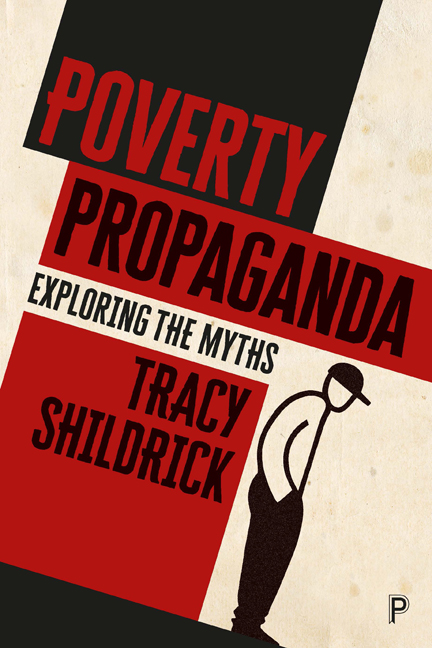Book contents
- Frontmatter
- Contents
- List of abbreviations
- Acknowledgements
- One Introduction
- Two Poverty propaganda
- Three Poverty and lived experiences
- Four Poverty, labour markets and ‘poor work’
- Five Poverty, social class and social immobility
- six Poverty: discrimination, stigma and shame
- Seven Poverty propaganda and reproduction of poverty, power and inequality
- Eight Conclusions
- References
- Index
One - Introduction
Published online by Cambridge University Press: 09 April 2022
- Frontmatter
- Contents
- List of abbreviations
- Acknowledgements
- One Introduction
- Two Poverty propaganda
- Three Poverty and lived experiences
- Four Poverty, labour markets and ‘poor work’
- Five Poverty, social class and social immobility
- six Poverty: discrimination, stigma and shame
- Seven Poverty propaganda and reproduction of poverty, power and inequality
- Eight Conclusions
- References
- Index
Summary
The issue of people moving repeatedly between work and unemployment is an endemic problem in the UK and has risen by 60 per cent since 2006, mostly as a result of the recession. Entering work cannot provide a sustainable route out of poverty if job security, low pay and lack of progression are not also addressed. (Goulden, 2010, p 1)
Evidence shows that poverty, and the insecurity that inevitably accompanies it, is affecting the lives of more and more ordinary working-age people and families, not just in Britain and the UK more broadly but also across the globe (Standing, 2010; 2014; 2016). Poverty has become a normalised aspect of day-to-day life for millions of individuals and families in Britain today, yet it occupies a peculiar and contradictory position in both popular and political debates. Poverty is widespread in Britain, as well as in the UK more broadly, and all indications show that its incidence, particularly for children and working-age households, will continue to rise under the current direction of policy (Hood and Waters, 2017). Poverty in Britain is most often caused by ‘poor work’ (Byrne, 2005) – that is, work that fails to take people away from poverty either for long enough or far enough to make a difference to their lives – and by inadequate ‘welfare’, particularly for those forced to rely on out-of-work benefits (JRF, 2016). More and more people find themselves trapped between the two as they cycle in and out of short-term, low-paid work and on and off inadequate (and increasingly difficult to access) ‘welfare’ payments. Yet the low-pay, no-pay cycle, as it is often referred to, still remains a relative blind spot in political and policy debates. Since 2010, cuts forced through in the name of austerity have also added to the problem, although the general trends towards increasing inequality and diminishing opportunities for those who are economically marginalised go back much further than the recession of 2008 and the subsequent imposition of numerous cuts. Yet, despite the widespread existence of poverty in Britain, it is all too frequently ignored, increasingly demonised and, when it is discussed, almost always presented in ways that are misleading and inaccurate.
- Type
- Chapter
- Information
- Poverty PropagandaExploring the Myths, pp. 1 - 20Publisher: Bristol University PressPrint publication year: 2018



